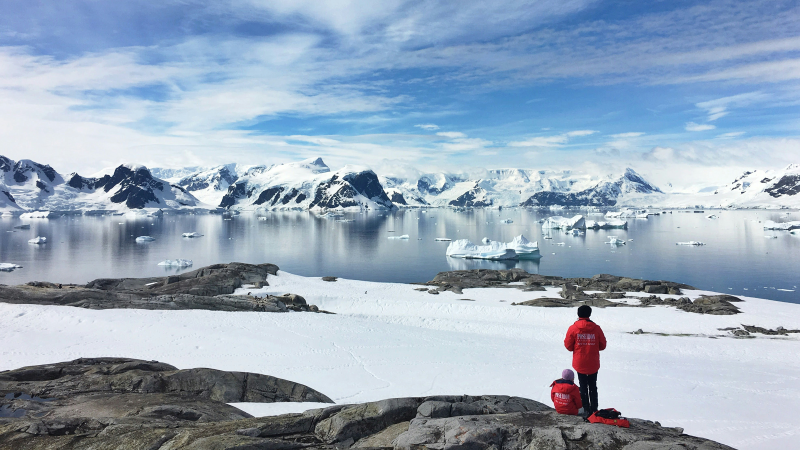After years of stability, Antarctica is losing ice
Category: Environment/Climate
Via: outis • 9 months ago • 4 commentsBy: SueEllen Campbell (Yale Climate Connections)


Sources to help you understand what the melting means

If you'd like to get caught up...
" When scientists tagged a curious seal, he led them to signs of a potential climate disaster " Is both amusing and terrifying.


Until recently, Antarctica's ice has seemed surprisingly stable. In contrast to the far north, the southern continent's massive ice sheets, glaciers, ice shelves (ice that floats on the ocean), and seasonal ice appeared to be reliably frozen: Enough snow fell in the high interior to compensate for what melted around the edges.
But the situation has changed. On balance, Antarctica is now losing ice. And more and more, scientists are concerned about that melting and its potential impacts — from sea level rise to changed ocean and air circulation to stress on wildlife — both local and global. Knowing that there is still much to learn, they are stepping up their research, despite the massive challenges in learning anything in such extreme conditions.
Winter 2023: record-low sea ice
" Where did all the Antarctic sea ice go? " "Full Story" podcast, The Guardian . This excellent 19-minute interview by Laura Murphy-Oates with Graham Readfearn (The Guardian's Australia environment writer) and oceanographer Will Hobbs clearly explains both the anomalous loss of southern sea ice last winter and its larger possible ramifications.
For a print account of the same situation, see " Dark waters as Antarctic researchers dive into grim climate picture ." Matthew Ward Agius, Cosmos.
Thwaites Glacier, the widest glacier on Earth:
" The Race to Understand Antarctica's Most Terrifying Glacier. " Jon Gertner, Wired . An interesting portrait of one scientist and the massive research project he is now part of, the ITGC. Though this article dates from before COVID-19 put the project on hold, it has lost none of its relevance.
The extensive website of this joint U.S.-U.K. effort includes a short video with clear graphics, an impressive list of participants, and an article about the goals of the current season , now underway.
" Warming seas are carving into glacier that could trigger sea level rise ." Chris Mooney, Washington Post. An intriguing account of some research from the '22-'23 season involving a robot exploring channels being cut into the bottom of the ice shelf by warmer water.
" Antarctica's Upside Down World ." Douglas Fox, BioGraphic. Studying the behavior of ice is leading to some other unexpected discoveries. One, the subject of this surprising piece, is a world of living creatures — such as sea anemones — attached to the bottom of the Thwaites Ice Shelf, far from any sources of light or food. Another story by Fox tells of under-ice rivers, some moving as quickly as a white-water river, and a cavern nearly tall enough to hold the Empire State Building: " A natural 'cathedral' lurks deep under Antarctic ice ." Science News Explores.
Beyond Thwaites:
" New research sparks concerns that ocean circulation will collapse ." Fred Pearce, Yale Environment 360. An influential new analysis, one "being hailed as a sea change in scientific understanding," predicts that ice melt in the Southern Ocean, not the North Atlantic, may well slow or even shut down the global conveyor belt of heat — and perhaps within a few decades.
" When scientists tagged a curious seal, he led them to signs of a potential climate disaster ." Chris Mooney and Simon Ducroquet, Washington Post. Sometimes, as in this case, the pleasure of reading a well-done article helps balance its bad news, here about East Antarctica, a region that has only recently begun to seem threatened. The opening: "This is a story about a curious seal, a wayward robot and a gigantic climate change disaster that may be waiting to happen."
" The race to understand polar ice sheets ." Leslie Carol Roberts, interviewing glaciologist Richard Alley, Knowable Magazine. Alley is both a leading ice researcher and an adept science translator; this interview focuses on investigations into the mechanics of ice-shelf calving in both Greenland and Antarctica.
" Ancient warning of a rising sea ." Sarah Kaplan and others, Washington Post. A fascinating interactive story about geologist Andrea Dutton's work in the Seychelles islands to track ancient sea levels through fossilized corals. Lots of insights here into how massive sea level rises have occurred in the past and might again in the future, thanks to melting of ice both high and low, north and south.
" Q&A: Warming of 2C would trigger 'catastrophic' loss of world's ice, new report says ." Multiple authors, Carbon Brief. This summary of the 2023 "state of the cryosphere" (frozen world) from the International Cryosphere Climate Initiative is a bit of a slog to read, but it's full of information about one possible future — one to be avoided if at all possible.
 SueEllen Campbell created and for over a decade curated the website "100 Views of Climate Change," a multidisciplinary collection of pieces accessible to interested non-specialists.
SueEllen Campbell created and for over a decade curated the website "100 Views of Climate Change," a multidisciplinary collection of pieces accessible to interested non-specialists.

Tags
Who is online
445 visitors

I admit I haven't gone through all of this...
Just more hysteria and fearmongering.
Hasn't worked, never will.
Great series on Nat Geo called, Continent 7 Antarctica.
Check it out.
" Ancient warning of a rising sea ." Sarah Kaplan and others, Washington Post. A fascinating interactive story about geologist Andrea Dutton's work in the Seychelles islands to track ancient sea levels through fossilized corals. Lots of insights here into how massive sea level rises have occurred in the past and might again in the future, thanks to melting of ice both high and low, north and south.
Here they go again, "how massive sea level rises have occurred in the past", ok so they know this happens already so then they do this "might again in the future", no not "might" its "will", and then in the same sentence they give why it "will" "thanks to melting of ice both high and low, north and south", where do they think all the water to cause the massive sea level rises in the past came from? And then the next question where did the water go that caused the massive sea level drops of the past? How about Ice Ages, so maybe they should be looking at the sea levels as the driving force of why the earth undergoes ice ages.